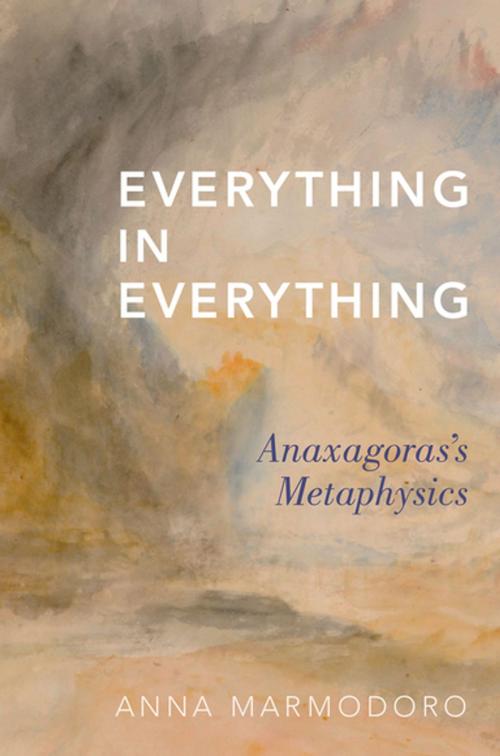Everything in Everything
Anaxagoras's Metaphysics
Nonfiction, Religion & Spirituality, Philosophy, Metaphysics, Ancient| Author: | Anna Marmodoro | ISBN: | 9780190668037 |
| Publisher: | Oxford University Press | Publication: | February 24, 2017 |
| Imprint: | Oxford University Press | Language: | English |
| Author: | Anna Marmodoro |
| ISBN: | 9780190668037 |
| Publisher: | Oxford University Press |
| Publication: | February 24, 2017 |
| Imprint: | Oxford University Press |
| Language: | English |
Anaxagoras of Clazomenae (Vth century BCE) is best known in the history of philosophy for his stance that there is a share of everything in everything. He puts forward this theory of extreme mixture as a solution to the problem of change he and his contemporaries inherited from Parmenides - that what is cannot come from what is not (and vice versa). Yet, for ancient and modern scholars alike, the metaphysical significance of Anaxagoras's position has proven challenging to understanding. In Everything in Everything, Anna Marmodoro offers a fresh interpretation of Anaxagoras's theory of mixture, arguing for its soundness and also relevance to contemporary debates in metaphysics. For Anaxagoras the fundamental elements of reality are the opposites (hot, cold, wet, dry, etc.), which Marmodoro argues are instances of physical causal powers. The unchanging opposites compose mereologically, forming (phenomenologically) emergent wholes. Everything in the universe (except nous) derives from the opposites. The opposite exist as endlessly partitioned; they can be scattered everywhere and be in everything. Mardomoro further shows that their extreme mixture is made possible by the omni-presence and hence com-presence in the universe, which is in turn facilitated by the limitless divisibility of the opposites. Anaxagoras tackles the logical consequences of the limitless divisibility of the elements. He is the first ante litteram 'gunk lover' in the history of metaphysics. He also has a unique conception of (non-material) gunk and a unique power ontology, which Marmodoro refers to as 'power gunk'. Marmodoro investigates the nature of power gunk and the explanatory utility of the concept for Anaxagoras, for his theory of extreme mixture. Whilst most defenders of an atomless universe nowadays argue for material gunk as a conceptual possibility (only), Anaxagoras argues for power gunk as the ontology of nature.
Anaxagoras of Clazomenae (Vth century BCE) is best known in the history of philosophy for his stance that there is a share of everything in everything. He puts forward this theory of extreme mixture as a solution to the problem of change he and his contemporaries inherited from Parmenides - that what is cannot come from what is not (and vice versa). Yet, for ancient and modern scholars alike, the metaphysical significance of Anaxagoras's position has proven challenging to understanding. In Everything in Everything, Anna Marmodoro offers a fresh interpretation of Anaxagoras's theory of mixture, arguing for its soundness and also relevance to contemporary debates in metaphysics. For Anaxagoras the fundamental elements of reality are the opposites (hot, cold, wet, dry, etc.), which Marmodoro argues are instances of physical causal powers. The unchanging opposites compose mereologically, forming (phenomenologically) emergent wholes. Everything in the universe (except nous) derives from the opposites. The opposite exist as endlessly partitioned; they can be scattered everywhere and be in everything. Mardomoro further shows that their extreme mixture is made possible by the omni-presence and hence com-presence in the universe, which is in turn facilitated by the limitless divisibility of the opposites. Anaxagoras tackles the logical consequences of the limitless divisibility of the elements. He is the first ante litteram 'gunk lover' in the history of metaphysics. He also has a unique conception of (non-material) gunk and a unique power ontology, which Marmodoro refers to as 'power gunk'. Marmodoro investigates the nature of power gunk and the explanatory utility of the concept for Anaxagoras, for his theory of extreme mixture. Whilst most defenders of an atomless universe nowadays argue for material gunk as a conceptual possibility (only), Anaxagoras argues for power gunk as the ontology of nature.















